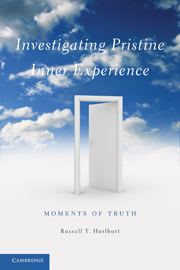Book contents
- Frontmatter
- Contents
- List of Figures and Tables
- Preface
- Acknowledgments
- 1 Moments of Truth
- 2 Fragmented Experience in Bulimia Nervosa
- 3 Apprehending Pristine Experience
- 4 Everyday Experience
- 5 Moments Are Essential
- 6 Experience in Tourette's Syndrome
- 7 The Moment (Not): Happy and Sad
- 8 Subjunctification
- 9 Before and After Experience? Adolescence and Old Age
- 10 Iteration Is Essential
- 11 Epistemological Q/A
- 12 A Consciousness Scientist as DES Subject
- 13 Pristine Experience (Not): Emotion and Schizophrenia
- 14 Multiple Autonomous Experience in a Virtuoso Musician
- 15 Unsymbolized Thinking
- 16 Sensory Awareness
- 17 The Radical Non-subjectivity of Pristine Experience
- 18 Diamonds versus Glass
- 19 Into the Floor: A Right-or-Wrong-Answer Natural Experiment
- 20 The Emergence of Salient Characteristics
- 21 Investigating Pristine Inner Experience
- Appendix: List of Constraints
- References
- Index
11 - Epistemological Q/A
Published online by Cambridge University Press: 05 June 2012
- Frontmatter
- Contents
- List of Figures and Tables
- Preface
- Acknowledgments
- 1 Moments of Truth
- 2 Fragmented Experience in Bulimia Nervosa
- 3 Apprehending Pristine Experience
- 4 Everyday Experience
- 5 Moments Are Essential
- 6 Experience in Tourette's Syndrome
- 7 The Moment (Not): Happy and Sad
- 8 Subjunctification
- 9 Before and After Experience? Adolescence and Old Age
- 10 Iteration Is Essential
- 11 Epistemological Q/A
- 12 A Consciousness Scientist as DES Subject
- 13 Pristine Experience (Not): Emotion and Schizophrenia
- 14 Multiple Autonomous Experience in a Virtuoso Musician
- 15 Unsymbolized Thinking
- 16 Sensory Awareness
- 17 The Radical Non-subjectivity of Pristine Experience
- 18 Diamonds versus Glass
- 19 Into the Floor: A Right-or-Wrong-Answer Natural Experiment
- 20 The Emergence of Salient Characteristics
- 21 Investigating Pristine Inner Experience
- Appendix: List of Constraints
- References
- Index
Summary
The questions in this book are based on real questions from reviews, e-mail exchanges, and question-and-answer sessions following presentations. I have edited the questions for readability, coherence, and context while trying to keep their flavor.
BRACKETING PRESUPPOSITIONS
Q: You have referred throughout this book to the “bracketing of presuppositions.” Can you elaborate on what a presupposition is?
A: Chris Heavey and I described presuppositions this way:
A presupposition is a preconception, something that is taken for granted. It is a notion about the world that is so fundamental that it exists prior to critical examination. It is something accepted without controversy as being true, something that shapes perception, behavior, and affect without the fact of that shaping being noticed or recognized. It is an unquestioned manner of relating to the world that chooses what is seen and what is not seen, what is experienced and how it is experienced, so invisibly that what is seen and experienced seems to be the world itself, not aspects of the world selected, shaped, and distorted by the presuppositional process.
(Hurlburt & Heavey, 2006, p. 151)Presuppositions cause you to turn away from evidence that might change your mind, cause you to assume that your currently used methods and procedures are adequate (if not downright virtuous). Presuppositions arise from (and at the same time create) a personally advantageous and self-sustaining mix of prideful, professional, social, economic, and other influences.
Information
- Type
- Chapter
- Information
- Investigating Pristine Inner ExperienceMoments of Truth, pp. 178 - 200Publisher: Cambridge University PressPrint publication year: 2011
